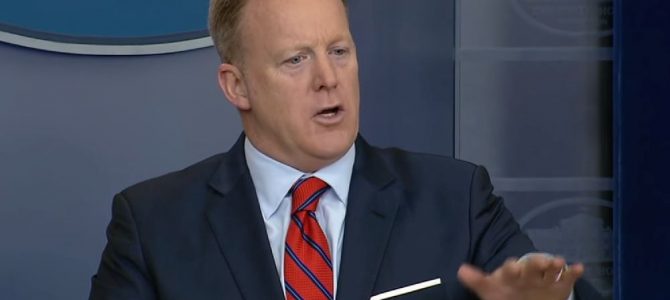A number of years ago when I covered the statehouse for The Republic in Columbus, Indiana, one of our local representatives told me something in an interview that further reporting revealed to be inaccurate. I duly noted the inaccuracy in the story, but my editor fired it back to me with instructions to give the guy a chance to amend his comment.
“There’s no reason to cut him off at the knees,” he said, pointing out the man had made a simple error of fact and didn’t appear to be intentionally trying to mislead. This was journalism as practiced in a medium-to-small Hoosier city where the focus of your story could well end up sitting on the lunch-counter stool next to you at, say, the Columbus Bar.
It seems unlikely that White House Spokesman Sean Spicer will be chatting over breaded tenderloins any time soon with the reporters covering the Donald Trump administration, especially after Tuesday’s eruption of calculated outrage over Spicer’s awkward misstatement of Hitler’s use of chemicals to kill in World War II.
No one in the room at the press briefing could have honestly believed he was intentionally denying Hitler’s killing of six million Jews and other minorities by gas and other means when he said that Hitler “didn’t even sink to using chemical weapons.” He was plainly speaking about the use of such weapons in combat, something he correctly insisted was internationally outlawed after the horrors of World War I.
This Is Just About Trump Again
Despite efforts to make Spicer’s comments an imagined Passover-week slur on Hitler’s Jewish victims, the real source of the outrage is simple Trump hating. The reality is that the press has declared itself the avowed enemy of all things Trump and could not possibly have missed this opportunity to paint him by proxy as a Holocaust denier.
Further, Spicer—like the president—has been clear in his complaints about the media’s shortcomings. So this is also payback by a press that claims the right to say anything about anybody, but is terribly tender about the flanks during discussions of its own flaws.
But the problem goes deeper than that. In fact this dust-up, like many of Trump’s tangles with the press, reveals much more about the press than about the president. If the persistent and willful refusal of the press to fill their vital role as a conduit of reliable, uncolored information is in many ways the critical public policy crisis of our times—because it controls discussion of and action on all the other problems—this latest dustup is an invaluable crystallization of it.
Trump Effect Again Reveals Press’s Corruption
In fact, this may be the chief benefit that Trump and his often ham-handed administration offers. Think of the Luminol sprayed at murder scenes in television police procedurals to cause occult blood traces to luminesce. To the extent that the media’s ruddering of public discussion is a purposefully occult process—driven by an entirely correct suspicion that the populace doesn’t share their views—the president is useful in precisely the same degree that he causes them to luminesce. And don’t they luminesce, typically in an incandescent rage visible beyond the horizon.
As the Beltway belligerentsia howls in trumped up outrage over this simple error, much of the rest of the country is shaking their heads—at least those who saw or sought out the full context of Spicer’s comments in the proliferating samizdat of outside-the-mainstream news sources.
This demonstrates the urgent need to do exactly that.









